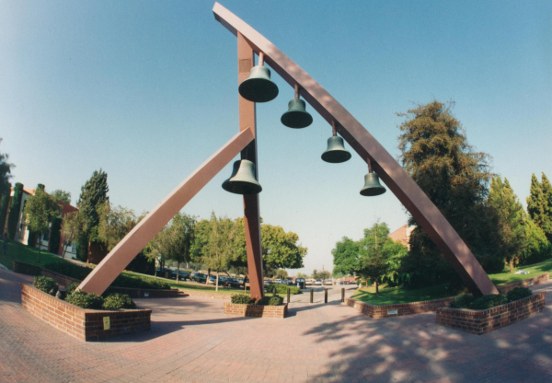podcast 11 – Tertullian the unitarian
Though he’s the first on record to use the Latin word “trinitas,” he was in fact a sort of unitarian.
Though he’s the first on record to use the Latin word “trinitas,” he was in fact a sort of unitarian.
I see trends in this analytic theology literature somewhat towards relative identity theories, and towards “metaphysical madness.”
Thinking about Trinity in grad school, reading Richard Swinburne’s The Christian God.
 Against Celsus is not the only important surviving book by Origen. Origen’s On First Principles is often called the first systematic Christian theology. It was written some time before 231. It is a bold and wide-ranging work, and in Origen’s day Christian theologians could speculate a fair amount.
Against Celsus is not the only important surviving book by Origen. Origen’s On First Principles is often called the first systematic Christian theology. It was written some time before 231. It is a bold and wide-ranging work, and in Origen’s day Christian theologians could speculate a fair amount.
But the curtain was brought down on this era of freedom by ecclesial-political events of the fourth century. While many still considered Origen a great scholar, the atmosphere was such that one might lose one’s church career if people thought you were too sympathetic to his views.
Among his admirers was the great scholar Jerome (translator of the Latin Vulgate Bible), but Jerome had do distance himself from Origen lest the heresy hunters get him. But still, people wanted to read Origen. Answering this need, Rufinus (d. 410) translated Origen’s On First Principles into Latin. Problem is, Rufinus systematically cut out and/or changed numerous passages that would not fit the new Pro-Nicene hegemony.
How do we know this? Because Rufinus tells us! He argues that heretics must have corrupted Origen’s works, since there just could not be a difference between those and the new catholic orthodoxy. Also, we have from other sources, e.g. letters of his contemporaries, the Greek texts of some of the cut and altered passages. In the excellent modern edition of the book, the editor-translator restores these to the text. Sadly, Rufinus’s Latin version is the only complete version we have of Origen’s book, so as it stands, the book is riddled with suspicious passages that don’t fit what we otherwise know about Origen, but which we have no textual grounds to correct. (On the whole crazy affair, see the above edition, pp. xxxi-lii.)
Here are some of the cut and restored passages; if you’re familiar with the “Arian” controversy and the trinitarian orthodoxy that coalesced and acquired the power of the Roman emperor at the end of the fourth century, you will not need an explanation why Rufinus cut them.
…the Saviour… is an image of God’s goodness, but Read More »trinitarian or unitarian? 7 – Origen uncensored
In 2007 I read Triads and Trinity, by the late Classicist and Egyptologist John Gwyn Griffiths, a book which tries to trace outside influences on the development of the Christian doctrine of the Trinity. I was skeptical about any such project, as I knew it has long been a staple of crackpot antitrinitarians to allege that the Trinity doctrine was illegally imported from (take your pick) Babylon,… Read More »Triads and Trinity: a mini-review
In Part 1 I explained how vague it is to say that there are three divine Persons “in” God. In Part 2, I described some different things one might mean by “Persons”. In this third part, I’ll explain some of many things it might mean to say that the three persons are one “substance” (Greek: ousia, Latin: substantia). But before I do that, it is… Read More »“the” Trinity doctrine – Part 3
“Well, who created God, then?” Many an atheist has lobbed this one, supposing it to be a devastating objection in question form. In reply, Christian philosopher Paul Copan knocks this one out of the park. Well played, sir. I would add a few points: One of the perfections a perfect being is supposed to have is aseity – existing but not because of anything else.… Read More »Copan answers: Who created God?
The so-called Athanasian Creed (also known by the Latin words it begins with, Quicunque vult) is considered by many to be the very definition of “the” orthodox doctrine. It is of uncertain origin, although many readers think it has a strongly Augustinian flavor (which if true shows it is not from Athanasius himself, who died before Augustine was converted). It has long been considered authoritative… Read More »The Orthodox Formulas 3: the “Athanasian” Creed
I’ve been reading Robert Letham’s The Holy Trinity lately. He’s a Reformed kind of guy, and like many contemporary theologians, he’s spent a lot of time thinking about Karl Barth. Now it’s well known that Barth in many places denies that he’s a “modalist” about the Trinity, and yet he says many things like these (these are quoted from Barth’s works by Letham): God is… Read More »yet more on Modes and Modalism: Barth and Letham
In this follow-up post, three factors that make Rufinus’ corruption of Origen’s On First Principles all the more egregious. First, after recklessly changing anything he doesn’t like in translating Origen’s book, absurdly claiming that anything Origen says that doesn’t comport with the (then) new Nicene orthodoxy must have been changed by heretics, and lyingly (or idiotically) claiming to have filled things in only with Origen’s other words or ideas… Read More »Rufinus’s corruption of Origen’s On First Principles – Part 2
 Over at Biola’s alumni magazine, Winter 2011 issue, theologian Fred Sanders has a piece in which he argues,
Over at Biola’s alumni magazine, Winter 2011 issue, theologian Fred Sanders has a piece in which he argues,
The Trinity is a biblical doctrine, but let’s admit it: There’s something annoying about how hard it is to put your finger on a verse that states the whole doctrine.
The Bible presents the elements of the doctrine in numerous passages, of course: that there is only one God; that the Father is God; that the Son is God; and that the Spirit is God. We can also tell easily enough that the Father, Son and Spirit are really distinct from one another, and are not just three names for one person. If you hold all those clear teachings of Scripture in your mind at one time and think through them together, the doctrine of the Trinity is inevitable. Trinitarianism is a biblical doctrine and all the ingredients are given to us there: Just add thought and you have the classic doctrine. (emphases added)
Hmmm…. I would have thought that the elements of “the” doctrine included that the three are same substance or essence (homoousios). And that the there are co-equal, and co-eternal, uncreated, though the Father timelessly generates the Son, and the Spirit proceeds from him (or if you’re Western/Latin – from both Father and Son). Maybe something about their having one “divine nature” as well.Read More »No “Trinity Verse” – A Good Thing?
This is your introduction to the statement most Christian philosophers start with.
In this episode we hear Mr. James Lee (PhD student in Philosophy at Syracuse University) present his paper “His Ways (of Being) Are Not Our Ways” at the Society of Christian Philosophers meeting on November 8, 2014 at Niagara University.

The more you think about hard stuff, the more opinions you get. I’ve taught philosophy of religion, modern philosophy, logic, and metaphysics courses, and so I have some fairly developed views. Based on theoretical (and non-theological considerations), here are some things I don’t believe in, because I think they’re impossible:Read More »Dealing with Apparent Contradictions: Part 11 – One last problem for Rational Reinterpretation
Kathyrn Tanner is a well-known theologian and author. While some of her work focuses on theological support for certain political views, she has also written Jesus Humanity, and the Trinity: A Brief Systematic Theology. To a philosopher’s eyes, this book is typical of much of the current theological literature. There’s not much argumentation for her views or against others’, nor is there any effort to… Read More »Kathryn Tanner’s non-Sabellian modalism
As promised, I now hope to run (walk, crawl?) through the gamut of theories of the Trinity propounded by recent analytic philosophers. My aim is to bring these articles to a wider audience, so I’ll try to write clearly, and focus on the what I think is important about the piece. I’ll try to omit needless details, and summarize or skip arguments that would throw… Read More »Transition, Theories
Now for another historical interlude – I’ll get back to current philosophy shortly. Regular readers will note that I’ve been insinuating for a while now that the way many people understand the mainstream, so-called “Latin” trinitarian position amounts to a certain variety of modalism (which entails S-modalism, to which I’ve objected). Some of you know that I also work on what philosophers call “early modern”… Read More »Nothing New Under the Sun – Part 1
Now, on to the Fourth Lateran Council, convened by Pope Innocent III in 1215. This council, considered the 12th “ecumenical” council, was one of the all-time most important councils, which strongly shaped catholicism in the “high†middle ages. It was called, in part, to get another crusade going, after some crusading failures and set-backs. The resulting “constitutions†were proposed (and to some extent written by?)… Read More »The Orthodox Formulas 5: The 4th Lateran Council (1215)
Most theologians, even ones who focus on the Trinity, seem completely uninformed about important work in philosophical theology.
Is my definition of the concept unitarian so wide that it would allow in some famous trinitarians?